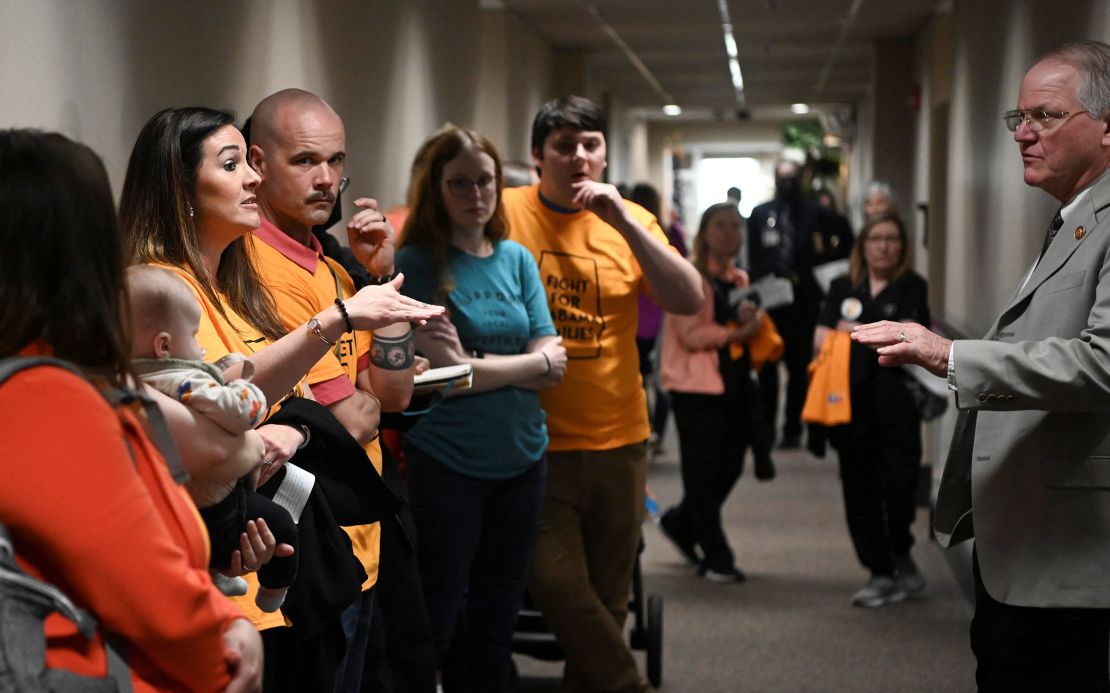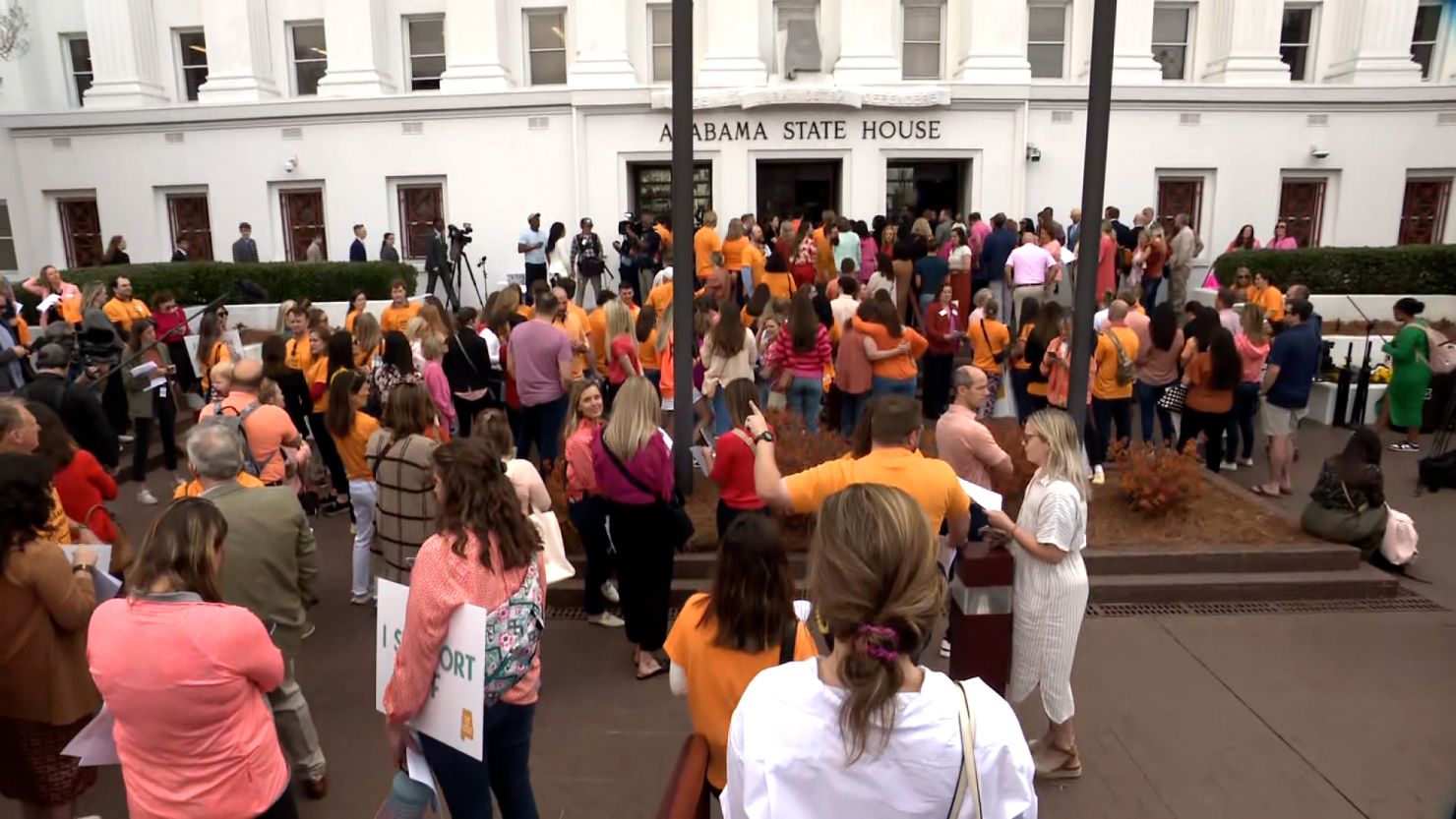A group of bills aimed at protecting in vitro fertilization (IVF) treatments in Alabama advanced out of Senate and House committees Wednesday – just a day after they were introduced – as state lawmakers race to respond to the state Supreme Court ruling that prompted clinics to pause parts of treatments and left many families in limbo.
The quick pace means new legislation that could restore those IVF treatments could pass as soon as next week. The high court’s ruling – which said frozen embryos are human beings and those who destroy them can be held liable for wrongful death – plunged the state’s fertility clinics into chaos and reproductive rights advocates urged state lawmakers to quickly provide guidance and shield IVF providers from potential legal liability.
Sponsored by Republican Rep. Terri Collins, House Bill 237 was passed unanimously by the House Health Committee Wednesday afternoon while a twin bill introduced by Republican Sen. Tim Melson, Senate Bill 159, advanced out of the Senate Healthcare Committee.
One state representative said HB 237 will head to the House floor Thursday and could be passed as soon as next Wednesday, a remark that was met with applause.
Those bills would “provide civil and criminal immunity to persons providing goods and services related to in vitro fertilization except acts of omission that are intentional and not arising from or related to IVF services.” If passed, both bills would apply retroactively.
A woman who urged House committee members to pass HB 237 said her current pregnancy would not have been possible without IVF. She said she decided to freeze her eggs at a younger age, after being diagnosed with cancer and receiving treatments that doctors told her would lead to infertility.
“I’m living proof of why IVF is so necessary,” she said.
Additionally, Senate Bill 160, filed Tuesday by Republican state Sen. Larry Stutts, also seeks to protect IVF providers from liability, but would not apply retroactively. It also advanced out of the Senate Healthcare Committee. Both Senate bills are expected to head to the Senate floor, where a debate and vote will likely take place.
“My bill is, to the best of my ability, trying to say what you were doing a month ago, you can keep doing. End of discussion,” Stutts said Wednesday afternoon.
Alabama Gov. Kay Ivey has said she expects a bill protecting IVF treatments to pass through the state’s legislature quickly. Both the state House and Senate must approve a bill before it is sent to the governor to sign into law.
“Here in Alabama … we work to foster a culture of life, and that includes IVF,” the governor told reporters in an unrelated event Tuesday. “The legislature is diligently working on addressing this issue as we speak, and I anticipate having a bill on my desk very shortly.”

While Alabama’s Republican Attorney General Steve Marshall has indicated his office does not intend to use the state court’s decision as a basis to prosecute families or IVF providers, at least one lawmaker has expressed concern that other law enforcement officials could.
Without clear guidance from any state or medical authority, the state Supreme Court’s ruling has created a climate of fear and uncertainty among Alabama providers, Katie O’Connor, the director of federal abortion policy at the nonprofit National Women’s Law Center, told CNN.
“What the Supreme Court of Alabama didn’t answer, but is certainly still out there and certainly on the minds of people who want to provide IVF, is whether criminal laws could be applied,” O’Connor said. “That is certainly a possibility and one that I think a lot of providers are unwilling to take the risk for.”
Woman details six-year journey to have a child
Three women, including two medical providers, spoke in front of lawmakers before HB 237 was passed, urging the group to advance the bill and protect IVF treatments.
One Huntsville woman told committee members she and her husband have been trying to build a family for six years, saying it has “dominated our marriage.”
The pair has gone through a number of procedures and challenges in that journey, including two egg retrievals, four embryo transfers and eight miscarriages, she said. Their efforts have amounted to roughly $100,000, the woman added.
Two weeks ago, they matched with a surrogate from Colorado, she said, but the Supreme Court ruling meant they could not get their embryos transferred there.
“If we do not have (our embryos sent to Colorado) within two to three weeks, we lose the match and we lose an additional $260,000,” she said, and urged lawmakers for “fast actions” for families going through IVF treatments.
“I was asked by a representative today if I was willing to risk my life for this bill to pass, and my answer is a resounding yes. Because I’ve already risked everything else,” she said.
Some Democrats voice concern over unanswered question
While the Republican-backed bills seek to protect providers, they do not address the issue of whether a frozen embryo is considered a human being, Democratic House Minority Leader Anthony Daniels told CNN on Wednesday.
Sen. Linda Coleman-Madison also voiced concern about the Senate bills, saying they would not offer fixes to the state Supreme Court ruling’s central question.
“Unless we redefine this, as far as whether an embryo is a child, and if we don’t deal with the elephant in the room that got us to this place, we’re going to be back here, and basically, we’re gonna be in limbo,” Coleman-Madison said.
Last week, Daniels introduced Alabama House Bill 225, which would declare “any fertilized human egg or human embryo that exists outside of a human uterus is not considered an unborn child or human being for any purposes under state law.”
The legislation would become effective immediately if approved by both chambers and signed into law.
Daniels also introduced House Bill 240 on Tuesday, which would amend a part of the state constitution that supports that rights of unborn children to note that an extrauterine embryo is not an unborn child. The Alabama House Democratic Caucus unanimously cosponsored that bill.
At the national level, Democratic Sen. Tammy Duckworth announced in a news conference Tuesday she would bring the Access to Family Building Act to the Senate floor Wednesday, aimed at protecting IVF access and shielding providers from punishment for providing IVF services. On Wednesday afternoon, Republican Sen. Cindy Hyde-Smith, of Mississippi, blocked quick passage of that bill.
Why providers say legislators can help
Until new legislation or policy is implemented in Alabama, many providers have their hands tied, Katherine Kraschel, an assistant professor at Northeastern University School of Law, told CNN.
“The only thing we can say with certainty is that now (providers) have exorbitantly more civil liability than they did before this case,” Kraschel said. “The rest is a big unknown abyss of liability.”
The University of Alabama at Birmingham health system – the state’s largest – is required to follow the court’s ruling, “unless and until it reconsiders its opinion, or the Alabama Legislature addresses it through legislation,” system spokesperson Savannah Koplon told CNN on Tuesday.
The health system became the first organization in the state earlier this month to confirm it was pausing IVF treatment out of legal concerns after the court’s ruling.
Alabama Fertility Specialists, who also halted some IVF services after the ruling, posted a video on Facebook on Sunday, saying its team was aware of proposed legislation to “save IVF in Alabama,” and urged people to show up “in massive numbers” to Wednesday’s protest.
Experts meanwhile are closely watching states that already have restrictive reproductive care policies in place. “I think you can expect the same states that have created sort of abortion deserts are likely the ones that will make IVF more difficult, if not impossible to access,” O’Connor, of the women’s law center, said.
Legislation around the issue of personhood could have far-reaching impacts, Kraschel said, citing questions including what happens to a couple’s embryos when they divorce. “All these personhood issues have broad sweeping implications, as states start to treat fetuses and embryos more like people,” she said.
CNN’s Rebekah Riess, Jamiel Lynch, Cara Lynn Clarkson, Morgan Rimmer, Meg Tirrell, Devan Cole, Melissa Alonso and Chris Youd contributed to this report.








